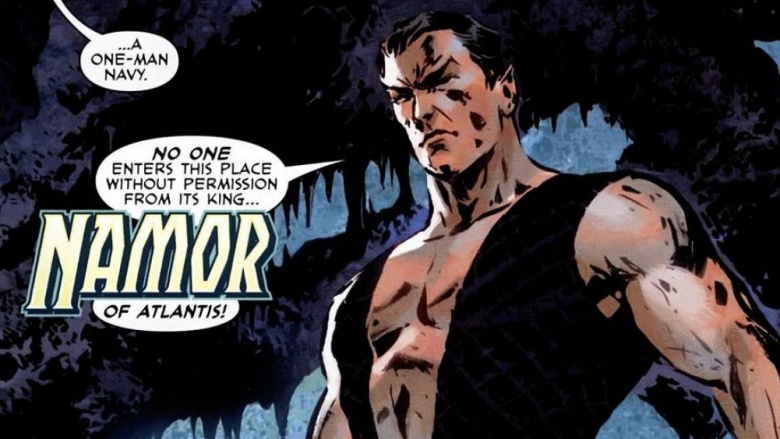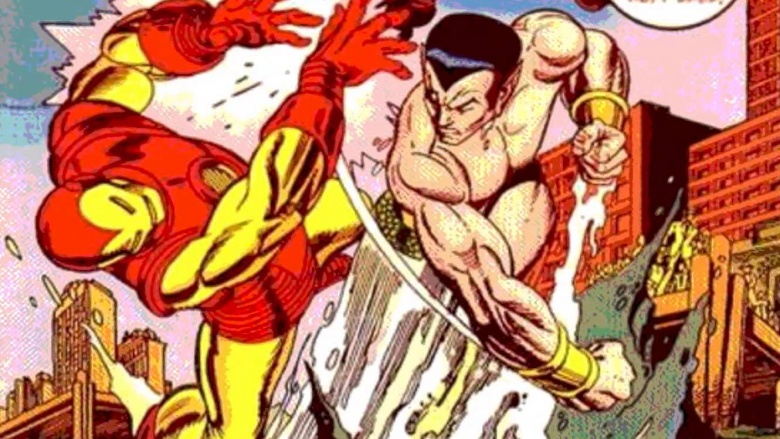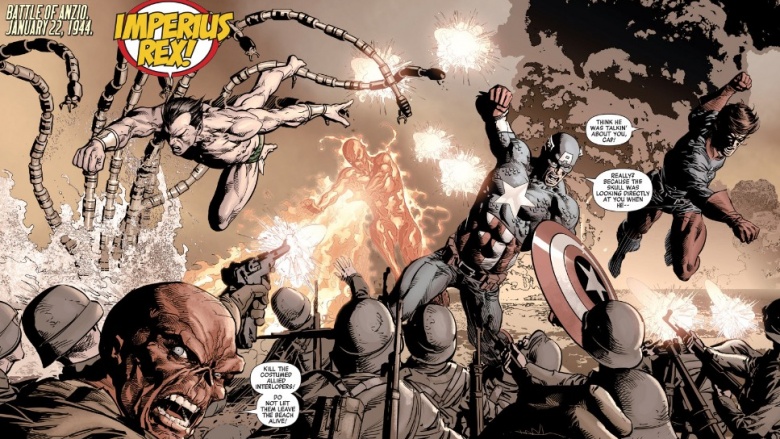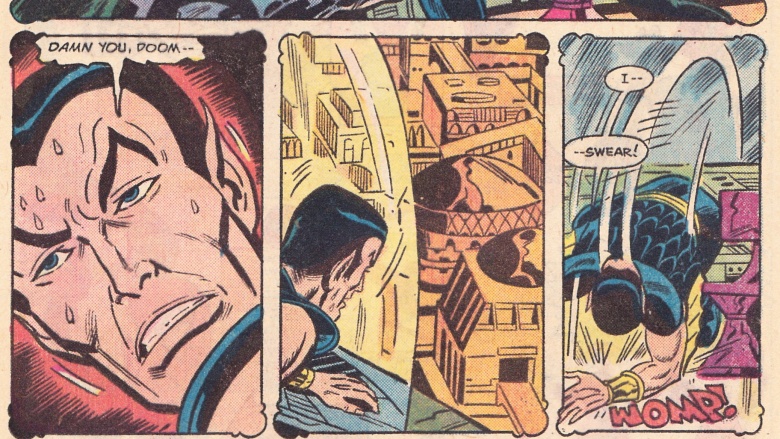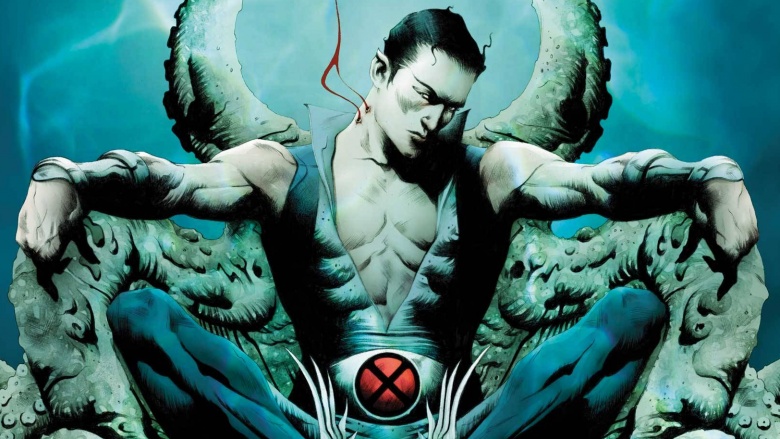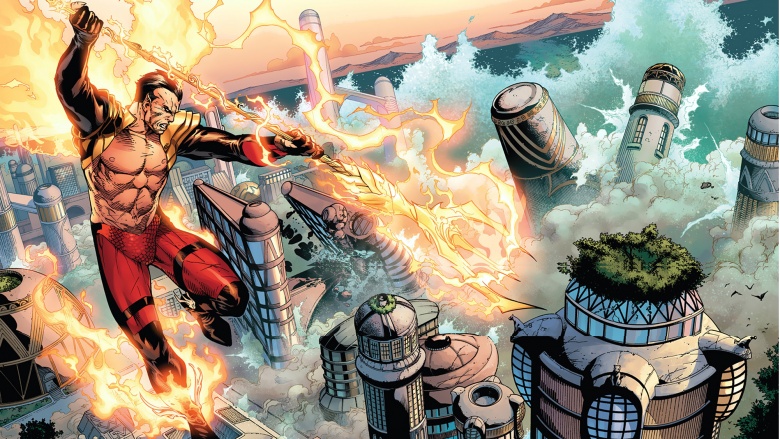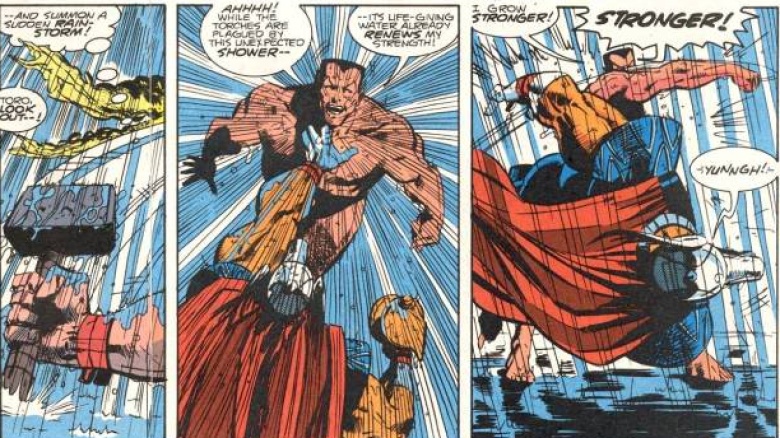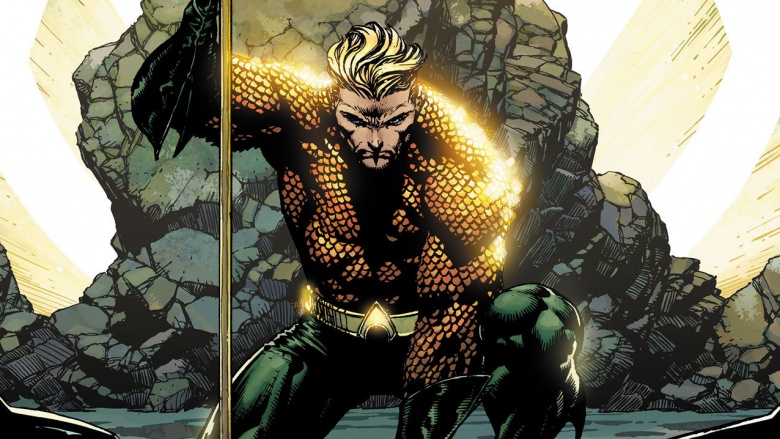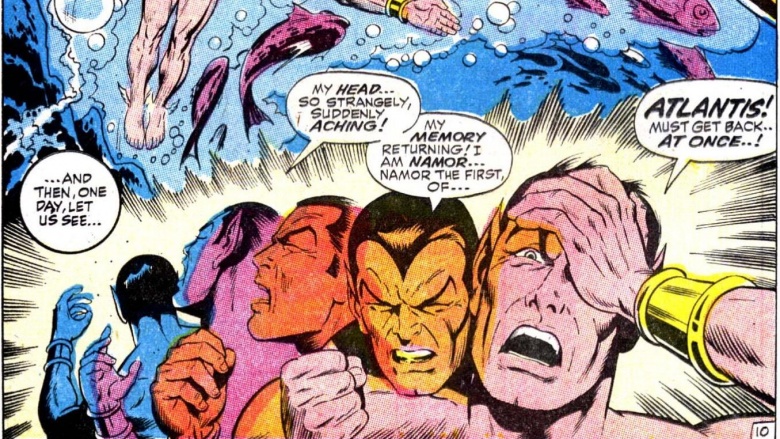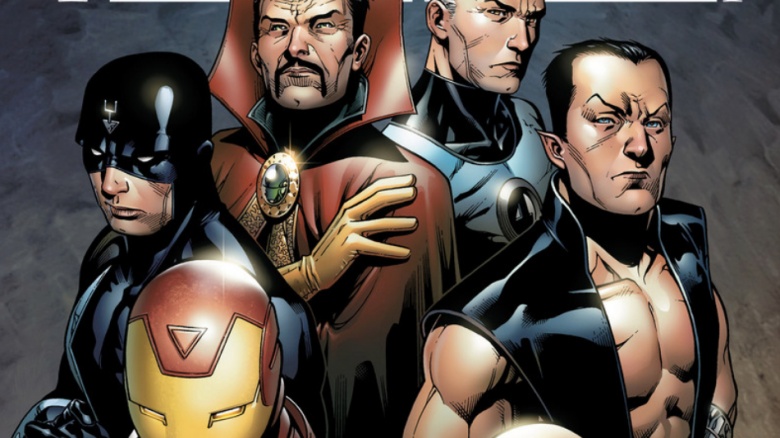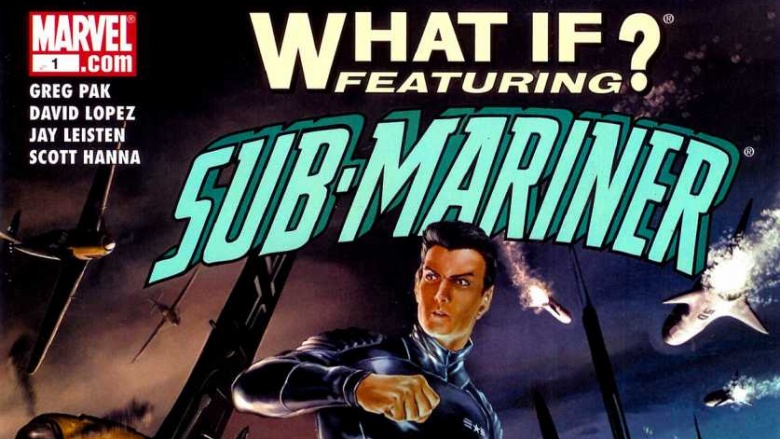Why Marvel Won't Give Namor His Own Movie
Namor the Sub-Mariner is a pretty cool comic book character. He has a wealth of exotic powers, has punched Nazis alongside Captain America, and flat-out tells Invisible Woman all the things adolescent Fantastic Four fans are thinking. For these and many other reasons, readers have clamored for a Namor movie for years—but there's an array of villains stopping its production, and it'll take more than an angry mutant in a speedo to stop them. Here are some of the biggest reasons Marvel will never give our favorite Atlantean his own movie.
Too many worlds
The Marvel Cinematic Universe subtitle really could be "oh, the places you'll go." The movies have taken us from Tony Stark's West Coast playground to an East Coast alien battlefield. We've explored the alien realms of gods and frost giants, and the depths of space big enough to contain talking trees. With a Captain Marvel movie on the horizon as well as Guardians of the Galaxy Volume 2, Marvel's outer space adventures will get even bigger, all while the Black Panther movie takes us to the secretive technological mecca of Wakanda.
So, why doesn't Namor fit into this big picture? For one thing, he's a package deal—we don't just get the salty superhero, but we'd have to explain where he comes from: the magical and mythical underwater realm of Atlantis. The bottom line is that this will be too many worlds for Marvel to explore at one time. Worst case, the entire conceit these movies are built on—that of an interconnected universe—would be challenged by the idea of an underwater kingdom that has apparently ignored any number of global threats. Think about your buddy who always asks "why don't the Avengers show up" every time you see a solo Marvel movie. With Namor in the picture, he'd have to start asking why an army of fish people don't save the day, and trust us: it'll stop being funny after the second time.
Question of rights
The world of Marvel movies has been fractured from the very beginning. The rights to iconic characters like the X-Men and Fantastic Four belong to 20th Century Fox, while the rights to Spider-Man were once the sole property of Sony Pictures. This leaves us with the question of where Namor actually fits in. Once upon a time, the rights to a Namor movie were held by Universal Pictures. Does Marvel have the rights now? That depends on who you ask and when you ask it. Marvel bigwig Joe Quesada said Marvel had the rights back in 2012. A year later, Marvel Studios chief Kevin Feige confirmed Namor still belonged to Universal. A year later, Feige described a hypothetical Namor movie as one that Marvel would make rather than another company, but quickly added that there are a number of complex deals and contract issues that would have to be smoothed over before it could happen. All of this adds up to a cinematic future murkier than the depths of Atlantis.
Impossible backstory
One of the double-edged swords in Namor's comic background is that he has some really cool superhero bonafides. After a retcon or two, Marvel established that Namor fought alongside Captain America and some other super-powered typed called the Invaders way back in World War II—a cool and compelling background story that has already been rendered impossible by the Marvel Cinematic Universe. The first Captain America movie as well as the Agent Carter television show firmly established a very human World War II, with the only superpowered people in the fight being Captain America and the Red Skull. A cinematic Namor would lack this interesting backstory and would once again leave viewers wondering what he and his people were doing during this period of violent worldwide upheaval.
Worst Kryptonite ever
In many ways, our superheroes are measured by their weaknesses. Part of what makes Joker the perfect foil for Batman is that he represents anarchy and chaos—the perfect antithesis of the order and control that defines Batman's world. Superman, on the other hand, can only be stopped by the rare mineral Kryptonite, which helps convince viewers that Lex Luthor and those with the knowledge and resources to find this substance are serious business. And if a hero is too easy to defeat, it leaves you questioning why he didn't die years ago, as any kid who ever saw Captain Planet almost die after getting dirt on his chest can attest.
What does this have to do with our favorite scantily-clad Sub-mariner? When Namor is in water, he's a bit of a Superman himself, able to lift up to 100 tons. On land, however, he begins to lose his powers, and if he's out of the water long enough, he becomes only slightly stronger than an average human being. Eventually, without direct contact with water, Namor will die. This, friends, is arguably the worst Kryptonite ever. Did we mention he's also weakened by polluted water? To defeat Namor, you don't need to harness a super-rare space rock—you simply have to keep him away from water. Or pollute the water. Hell, you simply have to do all of your criminal business sufficiently far from water and you have a relative safety net. How many Marvel movies take place primarily underwater? And in completely clean water, to boot? Next to the Avengers, Namor would come across as little more than a pointy-eared musclehead in a speedo.
The mutant problem
Remember when we talked about those tricky Marvel movie rights? This sometimes produces some unintentional hilarity. For instance, the Marvel Cinematic Universe not only cannot use the X-Men, but it cannot use concepts associated with the X-men universe. This is why Marvel's movies go out of their way to establish Quicksilver and Scarlet Witch as "miracles" created by HYDRA rather than "mutants" (the children of Magneto, no less) as they once were in Marvel's own comics.
A Namor movie would encounter a bit of a problem in this regard. Namor has a powerset that would make even Superman blush, including the ability to fly. The other Atlanteans don't share his range of powers and strength, and this is chalked up to Namor being a mutant. In fact, part of Marvel's comic marketing for Namor has been to bill him as "the world's first mutant." If he gets his own movie, there would be the need to explain exactly how he got his fantastic powers, and "HYDRA did it" is getting a bit old.
The terrorism thing
The world "antihero" gets used a lot. Typically, this is used to describe heroes such as Punisher and Deadpool—characters that use uncomfortable levels of violence and show a bit of moral flexibility when it comes to accomplishing their goal. Namor, however, has been an outright villain at times, and a surly antihero at others. For instance, some of his earliest stories involved him being the vessel for his people's rage against us evil surface-dwellers. Later, when he thought Atlantis had been destroyed by nuclear testing, he found renewed rage against humanity—and when he actually found his people, he did the completely normal thing: tried to invade New York with a giant whale monster. He was, of course, stopped by Earth's heroes, but he would serve as a villain several more times over the years, including the time he destroyed Black Panther's stomping grounds of Wakanda.
Simply put: superhero cinema—and Marvel movies in particular—don't have a ton of room for this level of moral flexibility. We're actually pretty hard-coded via movies like The Avengers to view the people unleashing killer monsters on the city as our bad guys. A cinematic Namor would need to try to give us a full arc of villain-to-hero redemption (tough to put into a movie that must also shoulder his origin story) or ignore his villainous aspects entirely. To many fans, that's an essential part of Namor's character, and neutering his contempt for humanity would make him just another super-strong guy (unless you're playing keepaway with his water bottle, that is—then he's just another guy).
His accent is a bit Thor
This reason why a Namor movie is a no-go is a bit of a deep dive—no pun intended. Since he returned to comics in the mid-'60s, writers have written Namor with pseudo-Shakespearean dialogue. This can be seen via his charmingly weird battle cry, "Imperius Rex," and in his day-to-day dialogue, in which he is as likely to quote actual Shakespeare as he is to use lines such as "the fair lady cannot help herself. She succumbs, finally, to the monstrous king." There's nothing inherently wrong with pseudo-Shakespearean dialogue, but when it comes to superhero cinema, you've already heard it. What would a Namor movie inevitably look like? He'd be a super-strong being from a completely different world trying to understand humanity while sounding like Shakespeare after he's had a couple of drinks.
That's pretty much the first Thor movie in a nutshell, and while Marvel has succeeded in ways we could never expect (hello, talking tree and raccoon!), their main challenge now is to present movies that are very distinct from previous releases—look at the great lengths Dr. Strange goes to in order to not be Iron Man all over again, even though it is, broadly speaking, about a man who finds fantastic powers and abilities in the course of trying to heal himself. Namor would be Thor 2.0—which would probably still be an improvement over the actual Thor sequel, but wouldn't exactly send audiences flocking to cinemas.
Similarity to Aquaman
This one's gonna be a low blow to Namor, but it has to be said: one of the primary reasons we'll never see a Namor movie is that Aquaman is coming out first. Namor is a super-strong half-human, half-Atlantean who can telepathically talk to sea life. And Aquaman is... a super-strong half-human, half-Atlantean who can telepathically talk to sea life. Each of them is the king of Atlantis, each of them has had a fractious relationship with humans, et cetera. Just as Marvel has no interest in creating a Namor that would bear uncomfortable comparisons to their own movies, they truly have no interest in creating a movie that will look like they're ripping off their main cinematic rivals. The irony is that the Namor of the comics was created well before Aquaman, and you could make a case that it was actually DC that ripped off Marvel. However, that's not what it would look like to the non-comics scholars that comprise the primary audience for superhero movies.
The longevity problem
Namor is supposed to be, chronologically, even older than Captain America. That means bringing him to the silver screen would create a lot of problems. To understand why, you must understand the narrative significance of Captain America being frozen in a block of ice for the better part of a century. If Cap had not been frozen, we'd have to deal with questions of how his body—whether living or dead—would have affected United States history. Was Vietnam fought with experimental super-soldiers? Was the Cold War fueled by a super-soldier arms race? We don't have to even worry about those things because narratively, Cap has been taken out of play.
In the comics, Namor has a slightly parallel history to Captain America. They both fought in World War II, and then Namor is discovered as an amnesiac homeless dude by the Fantastic Four. This emphatically would not work for the Marvel Cinematic Universe. You might think they could just say he's been an amnesiac for decades in this universe, but we have a problem here: assuming amnesiac Namor encounters water at some point, he's going to manifest super-strength and other powers. The Marvel movies and extended TV universe have established that SHIELD specializes in tracking, "indexing," and either protecting or containing these sorts of super-powered people.We also know SHIELD was active for decades. In short: it's impossible to believe Namor wouldn't have been discovered, and if he's not presented as an amnesiac, it's impossible to believe he'd stay silent through decades of nuclear testing, war, pollution, and every other threat to his kingdom.
He makes for a better partner, and even better villain
Historically, audiences have liked Namor as a character for others to bounce off of. He's a great rival for the romantic affections of the Invisible Woman (and, of course, a great foil for her husband), a cool ally of the X-Men, and an interesting addition to the Illuminati (no, seriously). However, what audiences haven't liked is Namor by himself. His last solo series was canceled in 2011 after just 11 issues—audiences couldn't even put up with a full year of our scaly superhero. Marvel Studios, however, is not in the business of cultivating sidekicks; they're always on the lookout for future solo movies (which is why Bucky's character will inevitably be presented as the new Captain America after Infinity War—you heard it here first, true believers). Basically, bringing in the character of Namor—including all the baggage of the Aquaman comparisons and the city of Atlantis—just to have an underwater Thor character in the mix as either hero or villain is much more trouble than it's worth.
The MCU that could have been
Regardless of the impossibility of his own movie, it's fun to imagine what Namor might have brought to the Marvel Cinematic Universe. It would be cool to see an army of Atlanteans repelling the next round of alien invaders, or seeing Namor shout "Imperius Rex" while trying to punch Thanos in the face. Heck, it'd be fun to see awkward flirtation between Namor towards Black Widow or Gamora. Alas, the Namor movie is less likely to happen than a gritty cinematic reboot of Howard the Duck, and in the finest Marvel Comics tradition, his fans are left to imagine "what if?"

